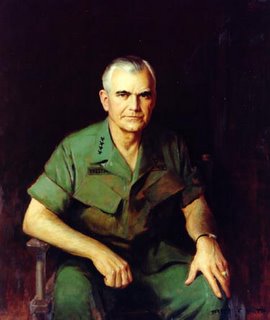Leadership.
This is coolbert:
It is generally recognized that leadership in the military is a constant necessary for success in combat.
At whatever echelon of command, leadership is seen as the key to success or failure.
Leadership is sound when the enlisted men have inspired CONFIDENCE in their officers. The officers are said to be leaders in that they are able to inspire their charges [the enlisted] to do things beyond the norm, sometimes in very dangerous and drastic situations [combat].
If leadership is sound and leads, the unit usually succeeds. Without leadership, the unit will generally fail.
[the failure at Abu Ghraib prison can be instantly seen as a gross failure of leadership. NOT only a failure of leadership, but almost the total absence of leadership.]
And the military does recognize that among leaders, some are born to command while others are not. Yes, certain basics of leadership can be understood and taught. And attempted emulation of successful leaders is quite often the norm among leaders, especially leaders of officer rank.
It should be stressed that there ARE some persons, who, for whatever reason or combinations of reasons, are just natural leaders. People just look up to the natural leader and EXPECT to be led.
Quite often natural leadership is demonstrated by a commander going against the grain. Against the generally agreed upon norms of behavior, and doing so with a positive intent in mind. A commander who in a demonstrative way SHOWS that they got what it "takes".
One such person was John Jacob Pershing. Known during his career as "Black Jack".

Pershing acquired this nickname as a result of his being WILLING to command black cavalry troops in the years prior to 1900.
When a command vacancy for a black cavalry regiment was made available, the U.S. Army found to it's chagrin that no officer [the officer corps was almost exclusively white at the time] was willing to fill this vacancy and command the black cavalry troops.
This duty [command black troops] was felt to the worst and most demeaning in the whole Army. Conditions for commanders and their families mirrored the poor conditions that the famous "Buffalo Soldiers" were forced to endure by a segregated and biased society.
The willingness of Pershing to command was evidently noticed, and this was taken as a sign of natural leadership ability on the part of Pershing. Later in his career, Pershing found that this prior command experience was a BOON to him. Experience in leading the forget-me-nots enabled Pershing to be considered for promotion and high rank, passing over many older men that had seniority over "Black Jack".
Another man who demonstrated natural leadership was William C. Westmoreland.

Early in his career, Westmoreland became the ONLY officer willing to talk with Benjamin O. Davis, a black officer and fellow West Point grad.
It seems that during his four year stint at West Point, the entire cadet corps gave Davis the silent treatment, so great was the dislike of having a "negro" around.
Upon graduating West Point, this silent treatment, a "gentlemen's agreement" continued.
With one exception.
That being Westmoreland.
It seems a special bond was forged between Westmoreland and Davis. This is even more remarkable in that Westmoreland came from a patrician South Carolinian family, at a time when lynching in the south was still not unheard of. Again, a man going against the grain and showing leadership in doing so.
[it is a little known fact that all during the Vietnam War, General Westmoreland had a house on Clark AFB where his wife had set up housekeeping. On weekends, the General would fly into Clark for a weekend of relaxation with his wife. All during that time, Benjamin O. Davis, himself by then also a General, was commander at Clark. It seems that Davis did not forget the friendship of Westmoreland, even many years later.]
General Westmoreland has himself expressed surprise at the fact that he seems to generate such natural leadership.
That people place a lot of confidence in him, look to him for guidance, and accept that guidance. Westmoreland first experienced this at the World Boy Scout Jamboree in Scotland when he was FIFTEEN years old.
He describes how the younger scouts DID look to him for leadership. To him, this was totally unexpected and surprising. Westmoreland also said that he was mystified when he was chosen as First Captain of his graduating class at West Point. The point is that Westmoreland did exert leadership, and did so in a natural manner.
[my personal opinion is that General Westmoreland "looks" like a leader. A man of physical stature [not overwhelming so] who has PRESENCE. When he is there, you know he is there. Still, even Westmoreland will admit that this is all somewhat of a mystery to himself. Perhaps he is being modest.]
coolbert.

0 Comments:
Post a Comment
Subscribe to Post Comments [Atom]
<< Home